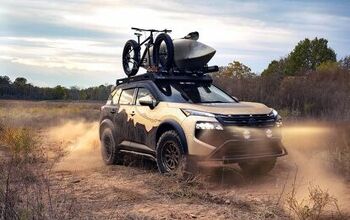Suppliers, Unite: BorgWarner to Buy Delphi Technologies

This new era of electrification has caused many an automaker to eye a competitor’s business, and suppliers are no different. Announced Tuesday, BorgWarner has decided to buy Delphi Technologies, uniting the two businesses to better capture the growing market for hybrid and electric vehicles.
The powertrain giant pegs Delphi’s enterprise value at $3.3 billion, making this acquisition its largest to date.
Approved by the boards of both companies and expected to close in the latter half of this year, the deal aims to “strengthen BorgWarner’s power electronics products, capabilities and scale” and ensure the company’s presence in the internal combustion, hybrid, and EV market, BorgWarner said.
Delphi Technologies was cast off from Delphi Automotive, a former General Motors holding, back in 2017. Last year, BorgWarner and Delphi Technologies recorded $10.17 billion and $4.36 billion in net sales, respectively.
The acquisition works as follows: Delphi Technologies shareholders receive 0.4534 shares of BorgWarner common stock, resulting in BorgWarner owning 84 percent of the new combined entity.
“This exciting transaction represents the next step in BorgWarner’s balanced propulsion strategy, strengthening our position in electrified propulsion as well as our combustion, commercial vehicle and aftermarket businesses,” said BorgWarner CEO Frédéric Lissalde in a statement.
Synergies aren’t seen as a key driver in the deal; BorgWarner estimates it will see $125 million in cost savings by 2023. Both companies have existing cost-cutting plans in place.
Since taking the helm of the company in August 2018, Lissalde has moved quickly to position hsi business as a leader in electrified components, even signing off on a demonstration car (buggy, really) to showcase its wares.
“My goal is to accelerate the evolution of the company toward electrification and hybridization, but without forgetting that internal combustion will be around for a long time,” he told Automotive News Europe last November. “Our sector, propulsion, is offering so much opportunity for us that there’s no need to look elsewhere.”
[Image: BorgWarner]

More by Steph Willems
Latest Car Reviews
Read moreLatest Product Reviews
Read moreRecent Comments
- Alan Where's Earnest? TX? NM? AR? Must be a new Tesla plant the Earnest plant.
- Alan Change will occur and a sloppy transition to a more environmentally friendly society will occur. There will be plenty of screaming and kicking in the process.I don't know why certain individuals keep on touting that what is put forward will occur. It's all talk and BS, but the transition will occur eventually.This conversation is no different to union demands, does the union always get what they want, or a portion of their demands? Green ideas will be put forward to discuss and debate and an outcome will be had.Hydrogen is the only logical form of renewable energy to power transport in the future. Why? Like oil the materials to manufacture batteries is limited.
- Alan As the established auto manufacturers become better at producing EVs I think Tesla will lay off more workers.In 2019 Tesla held 81% of the US EV market. 2023 it has dwindled to 54% of the US market. If this trend continues Tesla will definitely downsize more.There is one thing that the established auto manufacturers do better than Tesla. That is generate new models. Tesla seems unable to refresh its lineup quick enough against competition. Sort of like why did Sears go broke? Sears was the mail order king, one would think it would of been easier to transition to online sales. Sears couldn't adapt to on line shopping competitively, so Amazon killed it.
- Alan I wonder if China has Great Wall condos?
- Alan This is one Toyota that I thought was attractive and stylish since I was a teenager. I don't like how the muffler is positioned.


































Comments
Join the conversation
"Synergies aren’t seen as a key driver in the deal; BorgWarner estimates it will see $125 million in cost savings by 2023. Both companies have existing cost-cutting plans in place." Corporatespeak translation: Jobs will be eliminated.
"My goal is to accelerate the evolution of the company toward electrification and hybridization, but without forgetting that internal combustion will be around for a long time." Yep. Decades. Especially considering EV sales fell last year: "Despite the debut of 45 pure electric and plug-in hybrids in the United States last year, only 325,000 plug-in passenger vehicles were sold, down 6.8% from 349,000 in 2018, according to Edmunds. That is just 2% of the 17 million vehicles of all types sold in the United States in 2019..." "The financial damage from EV overreach could be severe. Global automakers will spend $225 billion on EV development between now and 2023, according to AlixPartners. But with overall auto sales falling in China, Europe and the United States, automakers face a “profit desert” for several years — or longer, if customers don’t come around." 'Los Angeles Times' Jan. 17, 2020